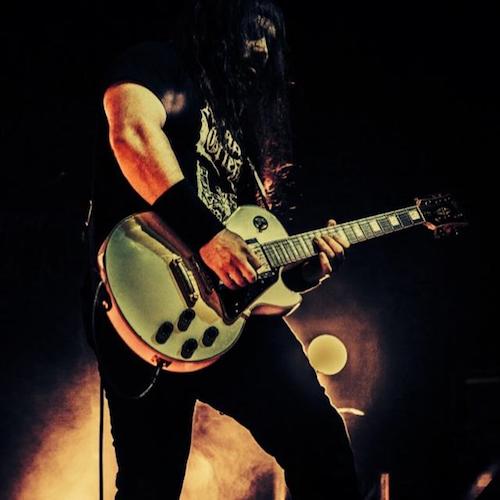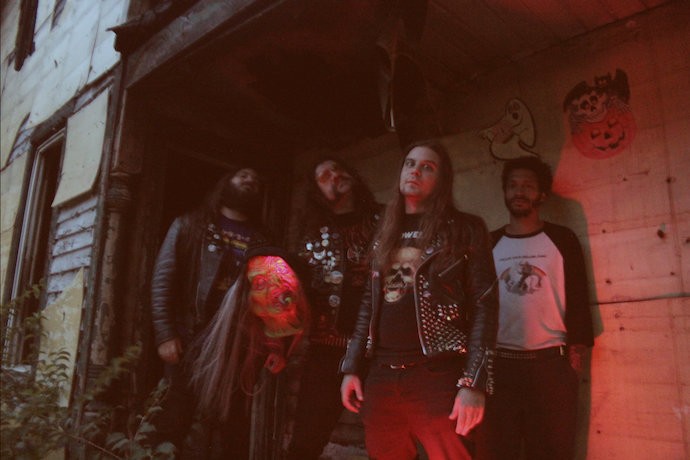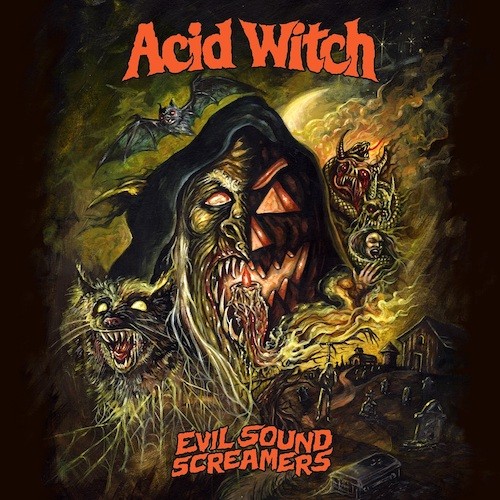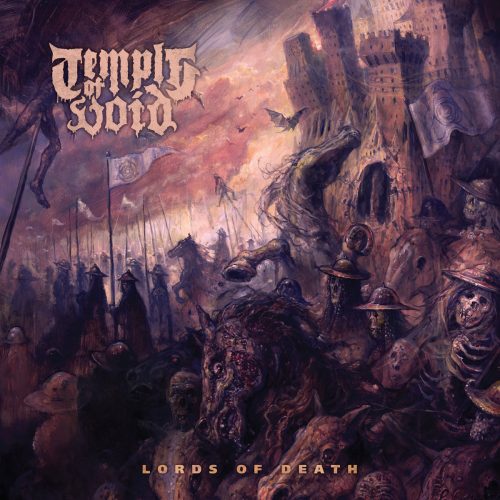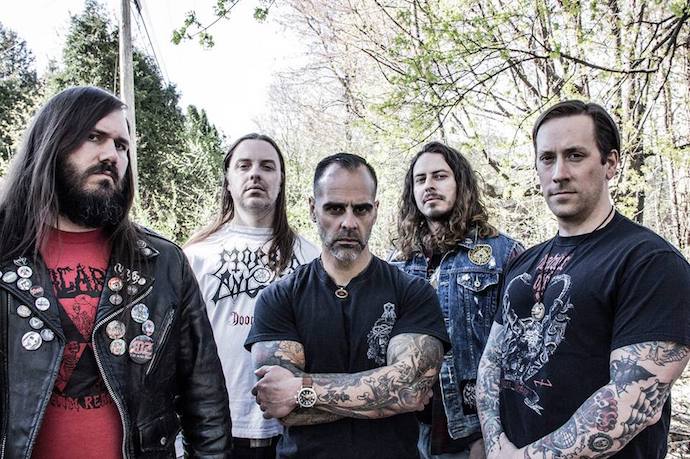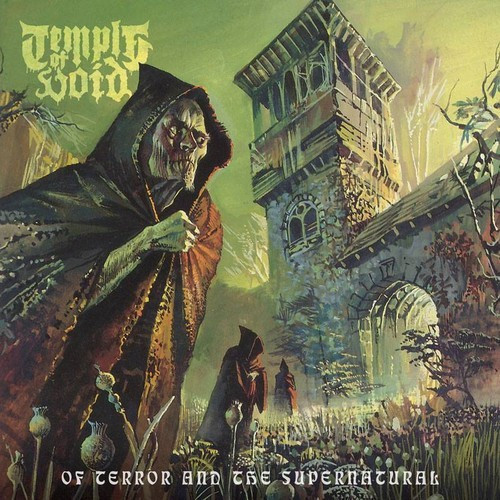(Comrade Aleks brings us one more interview for 2017, and it’s a big one — an extensive discussion with Detroit-based vocalist/guitarist Michael Erdody, who is a key part of two distincive bands who released excellent albums this year — Acid Witch and Temple of Void.)
Michael Erdody is a perfect interlocutor. He plays in a bunch of bands, including two outfits which represent the stronger side of US extreme doom bands and has a lot to tell.
In 2010 he joined a lunatic psychedelic death doom carnival known as Acid Witch; he plays guitar with these monsters, and the release of the band’s third full-length Evil Sound Screamers on October 31st was a big event in the underground metal scene. Besides that, since 2013 he has run the bloodthirsty Temple Of Void, who are well-known for their uncompromising and aggressive death doom works; Michael is responsible for growls in the Temple, and their sophomore album appeared a few months ago on Shadow Kingdom Records.
I’ve tried to shoot two hares with one round and asked Michael about both bands. It took some time but I’m glad to say that he provided answers patiently and in detail.
Hi Michael? How are you? How did you spend Halloween? Did the neighbors grant you enough candies or did you just burn down all their nearby houses?
My Halloween was pretty low-key. I spent the evening in my new place spinning old Halloween records and giving out treats to the little neighborhood ghouls. Once that ended I settled down in front of the TV, drank a beer, and wound down the night with a couple horror movies, which the latter really isn’t too different from any normal day.
I can’t avoid this retrospective question, so really… how did you and the band figure out this crazy concept for Acid Witch? Death metal growling, psychedelic keyboards, the crazy groove, and horror movie influenced lyrics… I wonder if anyone could have imagined all of these in one place!
I think the band is essentially a sum of everyone’s individual interests and influences. Most of the themes and style of Acid Witch was a precedent set before I joined the band. Witchtanic Hellucinations had already been released for almost two years before I began my tenure with the group. It combines death and doom metal with Shagrat’s horrific art sensibility and Slasher Dave’s unapologetic love for Soundtrack music and the dark ambience of old Halloween records.
When I was first asked to play with the group, I was excited because I considered their influences very akin to my own and felt it was a project where I could really bring something to the table. Even with the heightened complexity and more dynamic arrangements on Evil Sound Screamers, the sound at its core is still very true to the path set on that first album. It’s still riff-laden and dark. It still draws from the same themes of Halloween, horror, gore, and drugs. It’s also an album with its own personality, and I hope stands alone on its own merit.
So Acid Witch’s previous LP Stoned was released seven years ago (and you joined soon after that). I believe that you didn’t spend all these years writing new songs for Evil Sound Screamers (besides those covers for the Midnight Movies EP and a few other smaller release), so why did you make us wait so long for the new stuff?
Everyone in Acid Witch has their own projects. Shagrat also plays in the band Shitfucker, and Slasher Dave has his own solo endeavors. Aside from Temple of Void and Acid Witch, I am also involved in projects such as Failed, Nuke, and co-running the Dystopian Dogs label. Everyone in the band also does art to some capacity. I don’t think the band was ever expected to be anything more than a studio endeavor. It has more-or-less been a band that operates in conjunction with when inspiration strikes.
For the last handful of years, we’ve been primarily focused on the band as a live entity. There has been such a demand for the band to tour and play festivals, it’s hard to balance meeting that demand with finding the time to write and record. You also need to consider that when Acid Witch gets some down-time, there’s always some sort of show/tour/recording happening with another band or some kind of art or design project. Everybody involved is incredibly busy. It’s difficult to get all the stars to align, so to speak.
Acid Witch – Hardrock Halloween
Acid Witch makes the impression of a band that is in demand. How fast did you get an offer with Hells Headbangers Records?
We played our first show as a full band at the end of January 2010. At that time I was told the band was not a part of Razorback Records anymore. Stoned, which was Acid Witch’s debut on Hell’s Headbangers, came out on Halloween of that same year, so the offer from Hell’s Headbangers had come shortly after we started playing live.
There are songs called “I Hate Halloween” and “Hardrock Halloween” on the album, and the album was officially released on Halloween as well. What about you — do you prefer the American version of Halloween or are you into the original pagan Samhain?
Well, we’re Americans, so naturally our personal experiences growing up were centered around the culture of Halloween. For me, it’s always been some of my favorite childhood memories, and one of the few holidays that I consider actually important in my life and one I regularly participate in. Being all fans of Halloween, it’s only natural to delve into the origins of the holiday, which is something I think all of us have done at various points in our personal lives. We’re all familiar with Samhain and the superstitions surrounding All Hallow’s Eve, which are pretty defined in the lyrics to songs like “Sabbath of the Undead.”
Another thing, particularly for us in the Detroit area, was the existence of “Devil’s Night.” Growing up, October 30th was commonly seen by Detroiters as a night of mischief and vandalism. For kids, it was a night to go out egging houses and cars, or throwing toilet paper into trees and other acts of juvenile trouble-making. Devil’s Night also had a more sinister side to it that resulted in a lot of arson and extreme vandalism within the city over the years. The lyrics Shagrat wrote to the song “Hardrock Halloween” touch upon both sides of this by telling a tale of a fatal encounter between some kids causing mischief on the wrong side of town and a group of metal maniacs on a drug-fueled crime spree.
Evil Sound Screamers really differs from Stoned, and I bet that your blood played its role there. How did you share duties during the work on these songs? Who offered most of the ideas for the album?
My influence is most present on “I Hate Halloween,” “Hardrock Halloween,” and “An Evil Sound Screaming” because I handle all guitar duties and most of the writing and arranging on those songs, but everyone offered riffs and ideas for the album. Some tracks were more collaborative, and others were written individually. Some songs were intended to develop and expand ideas that were touched upon in previous recordings.
For example, Slasher Dave and Shagrat wrote a song called “Mr. Biestle” that pays homage to Midwest death like Macabre, which was something we introduced in the song “Fiends of Old.” However, we gave it an Acid Witch touch that delivers like a dark children’s Halloween record. Songs like “I Hate Halloween,” “Mutilation Mansion,” and “An Evil Sound Screaming” take the familiar Acid Witch template and combine it with an elevated level of orchestration with the guitar and synth layers, bringing to the forefront a heavy Goblin influence and progressiveness that may have originally gone under the radar for some with the Stoned album.
Other songs on the album have made attempts to push the band to new boundaries. Slasher Dave’s “Cheap Gore” drives the tempo with bursts of punk and straight-forward death metal, while I wrote “Hardrock Halloween” with the intention of introducing a song with doomy riffs but also a high degree of catchiness and pop-sensibility; sort-of Acid Witch’s equivalent to the anthemic, heavy metal horror movie soundtracks we covered on the Midnight Movies EP.
Do you remember yourself without horror movies, without extreme metal? How long ago were you infected?
I was lucky enough to get into heavy metal and horror at a pretty early age. Some of my earliest memories are watching horror movies at my father’s house. He would pick me up on the weekends, and one of our routine trips was to the local video stores. I grew up in the golden age of home video, and over the years probably rented out the entire horror sections of every store in the area. I was obsessed with monsters, and would constantly be reading ghost stories and drawing them; enough that I’d always get in trouble at school for having notebooks filled with zombies, werewolves, and other grotesque creatures I’d draw up from my own head or from some story I read or movie I had watched over the weekend.
Queen was probably the first band that I attached myself to as a child. I used to sneak and go through my father’s records when he wasn’t looking because I liked checking out all the different album artwork. I distinctly remember stumbling upon News of the World and thinking the gatefold of the giant robot with the band as a bunch of corpses in its hand was one of the coolest things I had ever seen. I also got into Black Sabbath because of how scary the witch was on the first album. It freaked the hell out of me as a little kid and I couldn’t help but give it a spin. Those two bands kind of set the pace for my musical taste from childhood through adolescence. From there you start listening to the typical stuff like Metallica, Megadeth, Ozzy, Motörhead, etc. You become aware of different metal sub-genres, and kind of the overall idea of heavy metal as a culture.
I stumbled upon the world of extreme metal ridiculously enough from seeing Cannibal Corpse in the movie Ace Ventura: Pet Detective when it came out in 1995. I remember seeing the band play “Hammer Smashed Face” and thinking it was completely absurd. I didn’t know what to think of Chris Barnes’s vocals and had never heard such unhinged riffing. Despite it being so initially over the top, I was really drawn to the technical aspect of the music itself. The band was enigmatic enough that I ended up buying a copy of The Bleeding shortly after and was introduced to the idea of death metal and the existence of a metal underground. Even today, I’m still always trying to seek out new stuff that I find novel, interesting, or inspiring.
Acid Witch – Cheap Gore
Acid Witch always looked like a maniacal massacre on Halloween with monsters, clowns, and gore all around, but one of your other bands is Temple Of Void, and it sounds damn serious. How have you separated the energy you put into these two bands?
Well, between Temple of Void and Acid Witch, I play two very different roles. Having two bands with somewhat parallel influence and style, it is vastly important to build a distinct separation between the two, otherwise there really wouldn’t be a point for both to exist.
Aside from maybe some ideas here and there, I really don’t try to contribute any sort of lyrical content to Acid Witch. That’s almost exclusively Shagrat’s department these days, and he does a fantastic job. There really isn’t a need for me to pen anything at this point. In Temple of Void, I get to write the lyrics. I get to choose the themes. I get to build the kind of aesthetic that I think fits the band best. As kind of a self-effacing guitarist who has always had a bit of an aversion to writing lyrics, it’s still very much a learning process, and as much of a cliched trope as “write what you know” can be, it’s kind of how I get by.
I’m always trying to create my own hypothetical horror story; sometimes it’s an idea that just comes to your head, and sometimes it’s putting your own spin on an idea you pulled from an old horror movie/comic, ghost story, or folklore. So far I’ve tried to make each Temple of Void album feel like an anthology of horror and each song its own separate, grisly tale. There is definitely a distinct sense of seriousness overall.
With Acid Witch, the themes are still very dark but delivered with a bit of tongue-in-cheek humor. Shagrat has always had a very clever way of addressing a lot of harsh and bleak subject matters metaphorically, touching on some very sinister subject matter despite some of the fun and cartoonish exterior the band has. In Temple of Void there’s a bit more straight-forwardness. I try to stay true and harken back to the somber and misanthropic styles pioneered by bands like early Katatonia, or the more romanticized side of British doom death like Paradise Lost and My Dying Bride.
The latest Temple Of Void album Lords Of Death saw the light of hell a few months ago. What kind of feedback did you receive?
The positive response to Lords of Death has been really flattering to everyone in the band. Everyone involved worked hard to make the album what it is, and the effort has paid off. I’ve seen a lot of accolades and great reviews, and now that we’re approaching the year’s end, we’re starting to see Lords of Death tagged in quite a few best of 2017 lists. We’ve gained a lot of new fans and appreciate all the feedback we get. This has been a huge year for death metal, so for some people to consider Lords of Death to be worthy enough to be placed alongside some of the genre’s best is very humbling.
We are very proud of the album as a band, and owe all of its success to the people who took the time to check it out and get some kind of enjoyment or inspiration out of it. Temple of Void strives to keep a grass-roots connection with fans. This is mostly due to our bassist, Brent Satterly, who oversees the bulk of the band’s mail order and takes the time to personally thank every individual who places an order. It’s this kind of kinship between bands and fans that keeps the underground strong.
Both Temple Of Void albums were recorded with the same lineup. What did you have in mind when you go into the studio to record Lords Of Death? Did you go there for changes?
I think as with any band, the ultimate goal is to improve with each album. It’s very common from a fan’s standpoint to latch onto the first record or the early material because that was their first exposure and what they’ve come to identify the band as in their own minds. So from a band’s perspective, the sophomore album can be a difficult process. You want to expand on what you can do as artists and further ideas you may not have fully realized on the earlier output, all without losing the overall vision or sound you created on the last album. With Lords of Death, we really wanted to trim all the fat and tighten the songs. As a result, the songs felt a lot better crafted; the riffs gained a degree of complexity, and doom elements were used with a bit more restraint to be the most dynamically effective they could be.
How are you serious growling all these things in this band? It looks like you literally live in this nightmare filled with fiends, ghouls, and the stink of charnel’s houses…
There’s a certain cathartic aspect to creating music and playing in a band. There’s a lot of negativity in the world. There’s a lot of horrible things human beings do to each other. There’s a lot of injustice, hate, greed, etc. It can be pretty overwhelming sometimes. Before I could play an instrument, I listened to a lot of music as a means of coping with emotions and dealing with the kind of general bullshit we all go through in our daily lives. As a musician, you have that unique ability to use your instrument, whatever it may be, as an extension of your own voice and emotions. I can write about fiends and creatures and reflect upon horrifying death because it allows me to expel all those negative emotions into a fictional universe of my own creation that is far more horrifying than reality.
Temple Of Void – The Hidden Fiend
How does your work in Temple Of Void differ from the way you do it in Acid Witch? Temple sounds like a merciless machine, like there’s no place for fun at all…
One thing I’ve learned from doing different projects over the years is that every band is not only a relationship, but its own organic entity. It’s a unique meeting of the minds with its own chemistry and ethics. Sometimes you mold a project to a strict vision, and sometimes you let a project develop naturally between the musicians involved. If Temple of Void sounds like a merciless machine, it’s due to Jason Pearce’s primal, single-kick drumming. His powerful and stripped-down style truly is the backbone of the band’s sound, a great compliment to the meaty riffing, and quite unique to the genre.
As for my work in both bands, I stated before it was important to build a distinction between the two. With Acid Witch, I was entering a project with an already established sound and image. I do my best to contribute ideas that I feel fit with the band. With Temple of Void, we were able to develop the band’s style together as a unit. While both bands draw influence from horror, we each use it very differently. The same can be said with use of nuance and atmosphere.
It seems that Acid Witch’s Evil Sound Screamers and Temple Of Void’s Lords Of Death were recorded in approximately the same period. Did you try to bring some ideas as the guitarist in Temple?
I’ve played guitar in some capacity on every Temple of Void release since the demo. While I will occasionally offer riffs and arrangement ideas, I try to leave most of the songwriting to the musicians in the band. Once a song starts coming together, I generally will listen and start coming up with vocal patterns and writing lyrics based on the vibes I get from the riffs.
Alex and Eric had a certain dynamic together, and now Don and Alex have started to come into their own dynamic as well. I try not to take too much away from that. If I do play guitar, it’s usually to complement their ideas, play a solo, or record something as its own separate instrumental. For Lords of Death, I played all the guitar and bass on “The Charnel Unearthing” as well as “An Ominous Journey,” and I also played the guitar solo on “Graven Desires.” I did the same thing with “To Carry This Corpse Evermore” and all the guitar solos on Of Terror and the Supernatural and the original demo.
The impressive artwork you chose for Of Terror And The Supernatural… how strongly were you influenced by Lovecraft? Do you have particular songs based on his mythology?
To be honest, aside from the Bruce Pennington piece we licensed for the album being originally used for the cover of a Lovecraft anthology, I try to avoid any sort of Lovecraft influence in the songwriting. There’s already so much out there that uses heavy Lovecraft influence and draws from the mythos. It’s played out in my opinion. I’d rather create my own mythos or tell my own horrific tale. There are definitely bands that use Lovecraft effectively; I personally would just rather pull ideas from less-tread territory.
You know Temple Of Void are damn close to the real death metal outfit state. May we suppose that with the next album you’ll finally get rid of the last pieces of doom in your music?
I certainly hope not! Lords of Death is definitely a bit more heavy-handed on the Death side of the spectrum, but the record as a whole is still very mid-paced and most of the songs still have doomy parts and crawling middle sections. Songs don’t have to have to be full of drawn-out passages or approach the ten-minute mark to be considered doom. In some ways Temple of Void hopes to show with this album that by consciously striving to trim all the fat, you can condense those influences into manageable song lengths that leave the listener wanting more, but still not compromise the heaviness, atmosphere, or doom-death ethos.
There’s so many bands playing straight-forward death metal these days. It’s an already saturated market, and I think completely dropping the doom from the band’s influences would kill a lot of the affect and ambience we’ve created with these last two albums. I have no desire to be just another death metal band, and that’s not to say there are not bands out there doing cool things within the genre today, I’d just rather maintain some distinction and not simply fall into the growing pack.
You don’t have to completely reinvent the wheel all the time, but it’s important to add your own touch or at least pay homage to your influences with the highest level of integrity that you can. With both Acid Witch and Temple of Void, I feel pretty lucky to be involved with two bands within the death metal spectrum who have establishe,d recognizable personalities and sounds. Not many people have that kind of opportunity, and I’m damn grateful to be so fortunate.
Acid Witch:
https://www.facebook.com/Acid-Witch-146053698843172/
https://acid-witch-detroit.bandcamp.com/music
Temple Of Void:
https://www.facebook.com/TempleOfVoid
https://templeofvoid.bandcamp.com/

